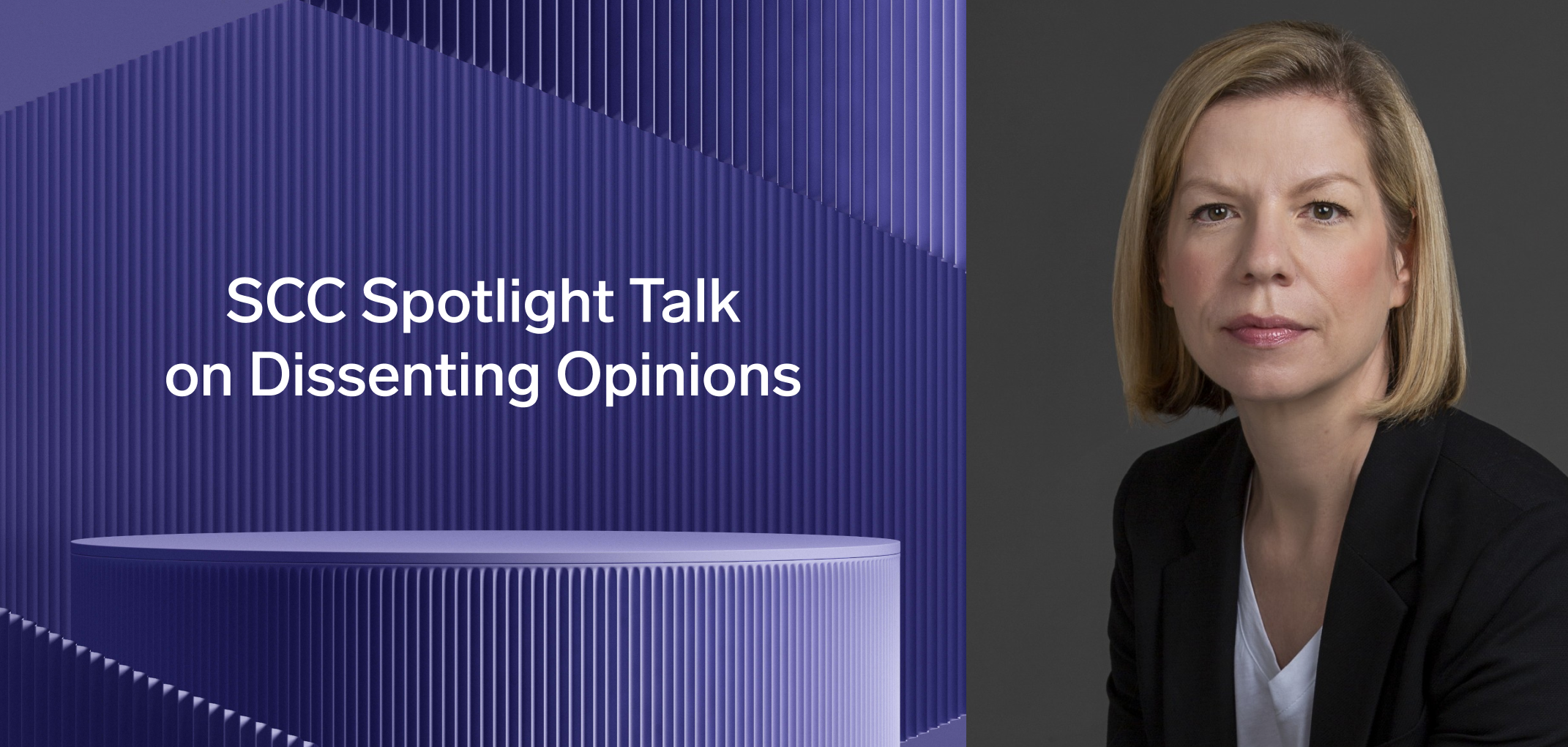SCC Spotlight Talk: Anne K. Hoffmann
Dissenting opinions in international arbitration are becoming increasingly common, raising important questions about their value and proper management. In this SCC Spotlight Talk, we speak with Anne K. Hoffmann, an experienced arbitrator, who shares her insights on this evolving trend and offers practical strategies for tribunal chairs navigating disagreement whilst fostering consensus.
Published

In your experience, how common are dissenting opinions in international arbitration?
In particular in commercial arbitration, dissenting opinions are not issued often. In investment arbitration, dissenting opinions are more frequent, which is due to the often public nature of these proceedings and the fact that certain issues concerning the interpretation of treaties arise repeatedly. But dissenting opinions are in my view also on the rise in commercial arbitration. One of the contributing factors to this development may be that commercial arbitrations are also no longer as confidential as they used to be, with awards and rulings more frequently being reported on.
What are your views on the value of dissenting opinions in international arbitration? Has it changed over the years?
I am of the view that dissenting opinions are not problematic per se and, in fact, can be valuable for a number of reasons. First, an award should always address all points that are relevant for the determination of an issue, including those that might speak in favour of a different outcome. These points need to be addressed in order for a ruling to be convincing and to ensure that the losing party feels that its views have been fully considered. It also is part of the exercise of building a reasoning that might enable the arbitrator who disagrees to ultimately accept the outcome of the arbitration, even though he/she might have preferred a different decision. However, if the majority of the tribunal is not willing or able to do that, a dissenting opinion is valuable as it ensures that the losing party knows that its positions have been considered. Second, in particular in investment arbitration, a dissenting opinion can contribute to the development of the law, by reference to it in subsequent decisions and through debate within the legal community. Third, dissenting opinions encourage dialogue amongst the members of the arbitral tribunal and a thorough reasoning of the decisions rendered. I have the impression that dissenting opinions are increasingly considered an accepted feature of arbitral awards.
How would you address the prospect of a co-arbitrator rendering a dissenting opinion? Are there any strategies that could (or should) be employed to prevent or manage dissenting opinions?
In an ideal world, an arbitral tribunal should attempt to agree and render an unanimous decision. When chairing an arbitration, I therefore try as much as possible to establish common ground between all members of the tribunal. That requires active involvement and a proactive approach. If I sense that an arbitrator might consider dissenting, I try to persuade him/her to reconsider by engaging with his/her views on the issue and see to what extent all arbitrators might be able to agree. That has worked for me in the past. If this does not result in complete agreement, it might minimise the extent to which one arbitrator may wish to dissent. It might also be an option to mark in the award that a certain decision is only agreed upon by the majority of the tribunal. This indicates that one arbitrator had a different view on an issue without issuing a full dissenting opinion. This approach may, however, not be an option if the differences are fundamental. In any event, if one arbitrator indicates that she/he will fully dissent, I think it is good practice to share a draft of the dissenting opinion with the majority of the tribunal while the award is being drafted so as to avoid surprises, or worse, ambushes.
How should dissenting opinions be handled with regard to confidentiality of the arbitral tribunal’s deliberations?
Dissenting opinions should focus on the substance of the issue(s) that cannot be agreed upon, without using inappropriate language or attacking the way in which the arbitration was conducted. If they do so, I do not see an issue with a potential violation of the principle of confidentiality of the deliberations.
Should arbitral institutions provide guidelines for dissenting opinions?
Overall, I do not think that this is needed. A dissenting arbitrator should always observe a certain etiquette, i.e. his/her opinion should focus on the issues that the arbitrator disagrees with. It should neither be disparaging nor disrespectful of the other tribunal members. But for that, we do not need rules or guidelines beyond those that already exist, such as the Chartered Institute of Arbitrators Practice Guidelines on Drafting Arbitral Awards which, in Article 3.3 of its Part I, addresses dissenting opinions. Beyond that, if one is in doubt about how to approach the subject procedurally, one can always consult with the administering institution.
Article keywords
CIArb Practice Guidelines, Arbitration best practices, Commercial arbitration, Investment arbitration, Arbitral tribunal, Tribunal chairs, Arbitrator conduct, Confidentiality of deliberations, Tribunal consensus, Award drafting, Arbitral procedure, Arbitrator ethics, Tribunal deliberations, Dissenting opinions, International arbitration.